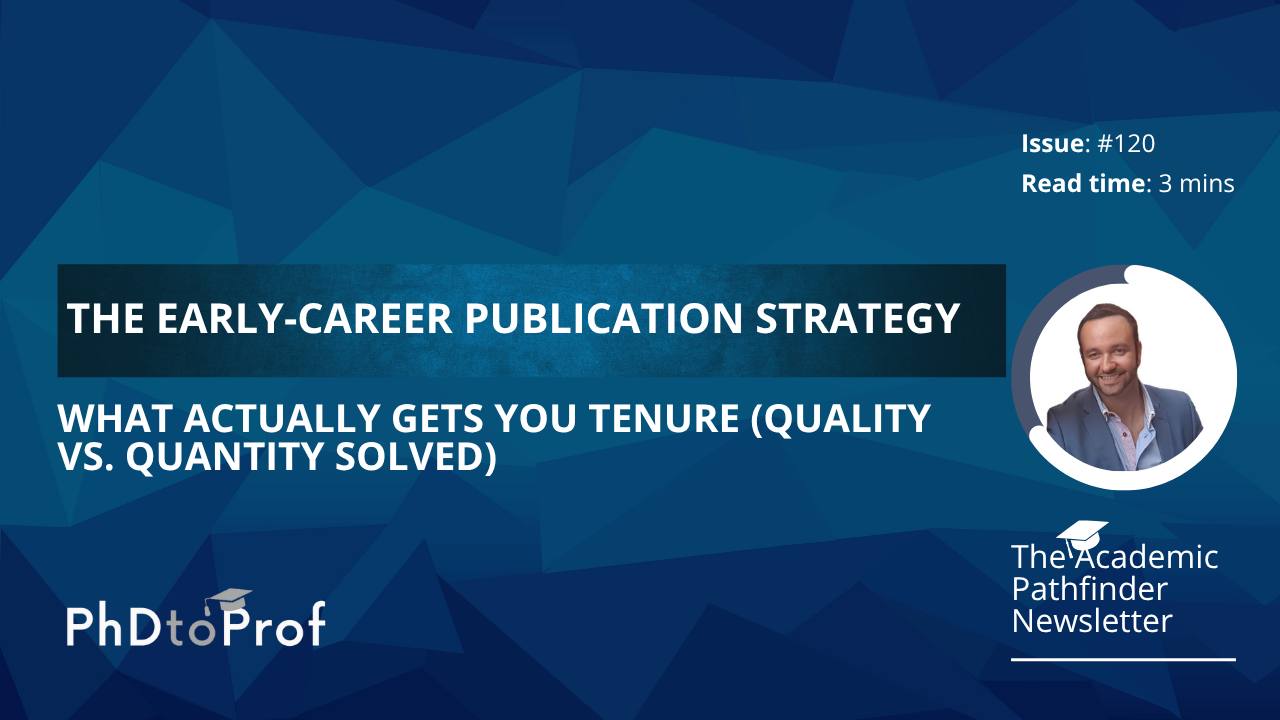#92 - The 90-Day Plan: Your First 3 Months in a Tenure-Track Position (What to Do When No One Tells You What to Do)

Today, I'm sharing the exact 90-day roadmap that my most successful mentees have used to hit the ground running, avoid common pitfalls, and position themselves for long-term success.
2 April 2025
Read time: 4 minutes
Supporting our sponsors directly helps us continue delivering valuable content for FREE to you each week — your clicks make a difference!
Anara AI
Transform your literature review process with Anara AI - a powerful tool that helps researchers uncover key insights and research gaps in minutes rather than months.Upload papers, ask targeted questions, and get immediate analytical summaries that highlight connections and opportunities in your field.Try it free at anara.com or use my code EMMANUEL20 for 20% off.
You've done it—after years of hard work, countless applications, and a grueling interview process, you've landed your tenure-track position!
But now what?
Most new professors receive a campus tour, a stack of paperwork, and then... silence.
Those critical first 90 days will establish your reputation, set up your research trajectory, and lay the foundation for your entire academic career...
...yet most institutions provide virtually no guidance on how to navigate this crucial period.
Today, I'm sharing the exact 90-day roadmap that my most successful mentees have used to hit the ground running, avoid common pitfalls, and position themselves for long-term success.
This week-by-week plan has helped dozens of new faculty transform overwhelming uncertainty into strategic advantage during their critical first three months.

When I started my first tenure-track position, I made nearly every mistake possible.
I said yes to the wrong committees, spent weeks setting up my office while neglecting my lab, and tried to completely overhaul my first course...
...all while failing to meet key people who could have accelerated my success.
It took me nearly two years to recover from these initial missteps.
After mentoring over 30 early-career academics through their transitions, I've identified clear patterns that separate those who thrive from those who struggle.
The difference isn't intelligence or work ethic—it's having a strategic plan for those first 90 days when the foundation of your academic career is being established.
Days 1-30: The Strategic Groundwork Phase
While most new faculty get caught in immediate demands, the first 30 days should focus on strategic information gathering and relationship building.
Week 1: Strategic Reconnaissance
The first week isn't about work output—it's about mapping the terrain.
These initial conversations will reveal the unwritten rules and power dynamics that formal orientation never covers.
Your ability to navigate the department's social ecosystem often matters more than your research brilliance.
🚩 Action strategy:
- Schedule 15-minute coffee meetings with your department chair and recently tenured colleagues
- Connect with department administrators and key facilities managers
Focus on listening rather than talking about your plans
Week 2: Research Infrastructure
Before diving into actual research, establish your operational foundation.
The systems you set up now will determine your productivity for years to come.
Most new faculty underestimate how much time basic infrastructure setup requires.
🚩 Action strategy:
- Create your lab/research space organization system
- Draft position descriptions for research assistants and identify promising undergraduate researchers
- Set up your reference management system and vendor procurement protocols
Week 3: Teaching Efficiency Systems
Create teaching systems that maximize impact while minimizing time investment.
Teaching can easily consume all your time if you don't establish boundaries early.
Your first courses will create lasting impressions with students and colleagues.
🚩 Action strategy:
- Build the complete structure for your first course with reusable assessment templates
- Establish office hour protocols and student communication policies
Identify one teaching mentor outside your department for objective advice
Week 4: Funding Pipeline Initiation
Start your funding strategy long before you're ready to submit.
Successful grant applications often require 6-12 months of preparation and relationship building.
The contacts you make now will provide invaluable insider guidance later.
🚩 Action strategy:
- Schedule a meeting with your university's research development office
- Identify 3-5 specific funding opportunities with deadlines in the next 12 months
- Contact program officers to introduce yourself using a specific template email
Days 31-60: The Reputation Establishment Phase
The second month focuses on establishing your presence and professional identity.
Week 5: Research Identity Crystallization
Define your research agenda before others define it for you.
If you don't clearly articulate your research vision, colleagues will pigeonhole you based on your dissertation or postdoc work.
This is your chance to establish your unique intellectual territory.
🚩 Action strategy:
- Draft a one-page research mission statement
- Create your research group website with clear research themes
- Schedule a brief presentation at a department meeting to share your research vision
Week 6: Strategic Alliance Building
Identify and connect with the people who can accelerate your success.
Academic success is rarely a solo endeavor—your network within the institution can remove obstacles or create opportunities that would otherwise be inaccessible.
Pay special attention to cross-disciplinary connections.
🚩 Action strategy:
- Map the informal influence structure in your department (who really makes decisions?)
- Schedule lunch with faculty from adjacent departments with complementary interests
- Connect with the grants specialist assigned to your department
Week 7: Teaching Brand Development
Establish your approach to teaching intentionally rather than reactively.
Your teaching reputation will follow you throughout your career at the institution.
Distinctive teaching methods will make you memorable to students and colleagues alike.
🚩 Action strategy:
- Observe classes taught by highly-rated teaching faculty
- Create your "signature assignment" that will become associated with your courses
- Schedule a consultation with your university's teaching center
Week 8: External Visibility Foundation
Begin establishing your external reputation systematically.
Your tenure case will ultimately depend on your reputation outside your institution.
Start building these connections now, even if they won't bear fruit immediately.
🚩 Action strategy:
- Update your academic profiles and create or refresh your professional website
- Connect with relevant academic society committee chairs
Reach out to potential external letter writers for future tenure review
Days 61-90: The Productivity Systems Phase
The third month establishes the routines and habits that will sustain your success.
Week 9: Research Productivity Pipeline
Create systems for consistent research output.
Your ability to produce research consistently will determine your tenure success more than any other factor.
Establish rhythms that generate momentum rather than requiring heroic effort.
🚩 Action strategy:
- Establish your weekly research schedule with protected time blocks
- Set up project management systems for ongoing research
- Create your publication pipeline document with targets for the next 24 months
Week 10: Teaching Efficiency Refinement
Optimize your teaching approach for maximum impact and minimum time.
The difference between good and excellent teaching often isn't more time, but more strategic use of time.
Focus on high-impact practices that benefit students while remaining sustainable for you.
🚩 Action strategy:
- Create your "teaching efficiency toolkit" with templates, rubrics, and reusable materials
- Establish boundaries around student accessibility that are sustainable
- Create a bank of assignment and discussion prompts you can adapt and reuse
Week 11: Strategic Saying No
Develop systems for protecting your time and priorities.
Your ability to decline opportunities gracefully will be as important as your ability to excel at what you accept.
Without a strategic approach to commitments, your time will be fragmented by others' priorities.
🚩 Action strategy:
- Create your personal criteria for evaluating new commitments
- Draft template emails for declining requests gracefully
- Schedule a meeting with your chair to discuss service expectations and boundaries
Week 12: Sustainable Success Planning
Establish the foundation for long-term success.
The habits and systems you establish now will determine whether you thrive or merely survive in academia.
Take time to reflect on what's working and what needs adjustment before patterns become entrenched.
🚩 Action strategy:
- Create your ideal weekly schedule template with clear boundaries
- Establish your personal productivity metrics and quarterly self-assessment checkpoints
- Identify your peer success group for mutual support and accountability

Key Takeaways:
Having this plan in place before you arrive will give you a significant advantage. Remember:
- Establish your external reputation from day one
- Prioritize relationships with influential department members
- Develop clear criteria for which opportunities to accept and decline
- Build your research infrastructure before diving into actual research
- Create teaching systems that maximize impact while minimizing time
→ Your Action Plan for This Week
This week, I challenge you to implement just one component of this 90-day plan:
- Create your "First 90 Days Success Document" using the template available in the resources section of our website
- Identify the five most influential people in your department and schedule brief meetings
- Draft your personal criteria for evaluating new opportunities and commitments
Well, that’s it for today.
See you next week.
Whenever you're ready, there are 3 ways I can help you:
1. Get free actionable tips on how to secure a tenure-track job in academia by following me on X, LinkedIn and Instagram.
2. Take my Academic Job Seekers Assessment quiz to receive personalised recommendations & discover my 6P Academic Job Accelerator Program.
3. If you're ready to take your PhD application journey to the next level, join my PhD Application and Scholarship Masterclass waitlist. Click the link below to learn more and secure your spot.



Responses